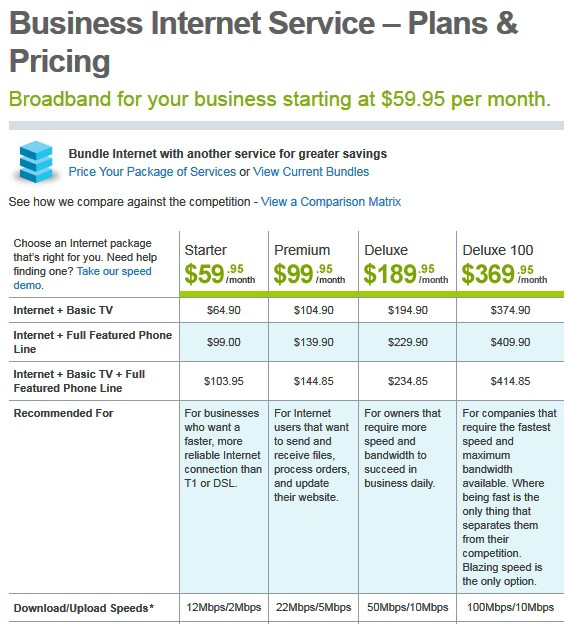 One of America’s largest midwestern cities is being victimized by not one, but two major Internet Service Providers with Internet Overcharging schemes that will limit broadband use by customers.
One of America’s largest midwestern cities is being victimized by not one, but two major Internet Service Providers with Internet Overcharging schemes that will limit broadband use by customers.
Charter Communications, which calls St. Louis home, delivers cable service to much of the city, and has lightly enforced arbitrary usage limits on its cable broadband customers since last November. AT&T, the major telephone provider, plans to limit its DSL and U-verse customers starting in early May.
“Now we get to choose between Charter’s usage cap or AT&T’s,” says Reginald, a Stop the Cap! reader in St. Louis. “As usual, AT&T is always the bigger ripoff — this company hasn’t done one consumer-friendly thing in at least a decade.”
Reginald is currently a U-verse customer who fled Charter around the time the cable company went bankrupt.
“Charter was, is, and will always be abysmal in providing good service and accurate bills, and I was not about to pay for their business mistakes,” Reginald writes. “When U-verse became available I told AT&T I was signing up because they were offering unlimited use plans and Charter was playing games with their usage cap.”
When AT&T’s cap is in place, St. Louis residents will get to choose between the lesser of two evils:
Usage Limits
- AT&T DSL Customers: 150GB per month
- AT&T U-verse Customers: 250GB per month
- Charter Lite/Express: 100GB per month
- Charter Plus/Max: 250GB per month
- Charter Ultra 60: 500GB per month
 AT&T will deliver three warnings and then a higher bill — $10 for each 50GB of “excess usage.” Charter sends out occasional warnings, then reserves the right to terminate your service.
AT&T will deliver three warnings and then a higher bill — $10 for each 50GB of “excess usage.” Charter sends out occasional warnings, then reserves the right to terminate your service.
“It stinks, and if I had my way I would not do business with any provider who has a usage cap,” Reginald says. “I would rather pay a few dollars more a month and not have to worry, and I can’t imagine I’ve ever used over 100GB in a month.”
Jess, another St. Louis resident, pulls the plug on AT&T U-verse May 2nd.
“I almost wanted them to charge me an early cancellation fee so I could pound them with their sudden change of terms,” Jess says. “I am switching back to Charter on May 2nd, the day AT&T starts their crap. AT&T acted all surprised about why I would possibly ever not do business with them over this issue.”
Jess says she would rather deal with warning letters from Charter than a higher AT&T bill.
“Every penny more AT&T gets from us goes right into their lobbying to screw consumers more, and here are the results for everyone to see,” Jess says. “If Charter wants to pull their games with me and my family, the next step is to declare war on the politicians who let this stuff happen.”
Bill says AT&T offered him a discount to stay with the company — he is canceling his U-Verse service May 1st. But he refused, telling AT&T he will not do business with a company that engages in Internet Overcharging.
“I’m not too worried about Charter,” Bill writes Stop the Cap! “If they try and threaten me, I’ll let them cut me off and then we’ll sign up under my wife’s name, and bounce from account to account.”

Your money = Their Money
For all three of our readers, none of whom claim they will exceed the allowance, it’s a matter of principle.
Reginald, Jess, and Bill all feel strongly usage caps and overlimit fees are unjustified, and are more about protecting video packages than “unclogging” providers’ networks.
Bob Zimmermann, an AT&T customer in Richmond Heights, tells the Post-Dispatch he doesn’t like the new limit either. He watches an occasional Internet movie, and sometimes downloads video to his iPad. He doubts he’ll exceed the cap, but he doesn’t want to worry about it.
He is shopping for alternatives.
“I’ll see if I can negotiate a better deal,” he told the newspaper.
Jess wishes him luck finding someone else in St. Louis. She suggests customers like Zimmermann play AT&T and Charter off each other to get a lower bill, at least temporarily.
“What is most important right now is to tell AT&T you are leaving them because they are abusive, and then sign up with a new customer discount with Charter,” Jess suggests. “Then if and when Charter cuts you off, go back to AT&T and see if you can get them to waive any fees after the third warning or else you are switching back to Charter.”
Another alternative is to sign up for Charter’s business service, which has no usage cap, but comes at a significantly higher price than residential service. Their starter package includes unlimited Internet at 16/2Mbps speeds, a domain name, and a business phone line with unlimited long distance and calling features. It runs a steep $120 a month.
 “If Charter didn’t offer a 500GB allowance on their 60Mbps tier, I might consider a business package if I used my connection a lot,” admits Bill. “Isn’t it ridiculous when someone wants to sell you a super fast package you cannot really use because of usage limits?”
“If Charter didn’t offer a 500GB allowance on their 60Mbps tier, I might consider a business package if I used my connection a lot,” admits Bill. “Isn’t it ridiculous when someone wants to sell you a super fast package you cannot really use because of usage limits?”
Bill partly blames the state legislature for letting AT&T get abusive with customers.
“AT&T shows up with a lot of cash to dole out in the Missouri legislature and in return they get to abuse customers,” Bill notes. “You notice Verizon cannot get away with this in the more consumer-protection-friendly northeast.”
Jess says the whole thing is a mess.
“It really shows how the midwest is getting screwed once again — this time for Internet access,” she notes. “There is no Verizon fiber here, and even Google showing up in Kansas City won’t be enough to shame the likes of AT&T.”
 AT&T sells business broadband service to at-home, small, and medium-sized businesses at a substantial discount for the first year — $30 a month for up to 6Mbps. A one year term commitment is required, but that likely won’t present any problems for customers who don’t have any other option for service. With an AT&T modem/router already in place, making the change should just require a phone call to AT&T.
AT&T sells business broadband service to at-home, small, and medium-sized businesses at a substantial discount for the first year — $30 a month for up to 6Mbps. A one year term commitment is required, but that likely won’t present any problems for customers who don’t have any other option for service. With an AT&T modem/router already in place, making the change should just require a phone call to AT&T.

 Subscribe
Subscribe









